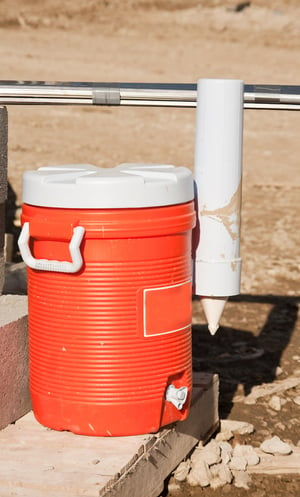This article I wrote originally was published by Techniques in May 2019. It appears below in its original entirety.
Failure, as perceived by most, is a sign of weakness but, instead, consider how failure presents an opportunity to learn, pivot and ultimately build resilience. Through experiential learning programs, like entrepreneurship education, students can develop a mindset where they become comfortable with the uncomfortable and learn adaptability, creative problem solving, communication, teamwork, and to manage failure.
Entrepreneurs Learn From Failure
CTE entrepreneurship teachers can help students work through failures to develop as lifelong learners in pursuit of career success. High school entrepreneurship education provides students with the opportunity to learn by creating their own authentic business. Along the journey, students develop soft skills and real-life skills to overcome setbacks and failures. As the graphic on the next page illustrates, there is a process to guide students as they create a business while allowing them to work through failures at every step, adapt and learn.
A high school student team from Barrington, Illinois, was challenged to identify a problem that they encountered personally. The team bonded over their frustration with their grandparents’ lack of technology skills; developed a business that offered mature adults a tutoring service to learn how to use their personal devices, such as smartphones; and created Funtastech. This was exciting and it seemed like a great idea, but …
The founders’ initial marketing plan failed during the minimum viable product (MVP) testing phase. The plan utilized social media advertising, which was ineffective as their prospective customers didn’t know how to use social media in the first place. They adjusted their approach and used traditional advertising in local magazines and flyers to find customers. These students owned their choices, drove their learning and found success.
Get to Failure Fast
Entrepreneurship fosters a process of creativity and discovery that incorporates failure and resolution throughout the journey. The process is fluid and allows for testing at each phase to encourage students to face and overcome obstacles with resolve at every step.
 Tilt-Factor, another student-run business from Illinois, learned to pivot during the business MVP stage while test marketing the viability of their business concept. The team’s business identified a problem associated with the wasted liquid at the bottom of the large five- and 10-gallon water coolers used at sporting events. The team wanted to develop a device that would drain the liquid in the cooler once the level fell below the spigot — in order to avoid waste. Tilt-Factor conducted micro-experiments (e.g., personal interviews and surveys) to test their assumptions.
Tilt-Factor, another student-run business from Illinois, learned to pivot during the business MVP stage while test marketing the viability of their business concept. The team’s business identified a problem associated with the wasted liquid at the bottom of the large five- and 10-gallon water coolers used at sporting events. The team wanted to develop a device that would drain the liquid in the cooler once the level fell below the spigot — in order to avoid waste. Tilt-Factor conducted micro-experiments (e.g., personal interviews and surveys) to test their assumptions.
Research indicated there was, indeed, demand for such a product in the marketplace and that potential customers would be willing to pay $40. The cost to manufacture the initial prototype was more than $200. The team leveraged their failure as an opportunity to retool their product design to meet market demand.
Develop a Growth Mindset
Teaching entrepreneurship to high school students nurtures a mindset for growth that enables students to learn that failure is not a permanent state but an opportunity to learn how to do something differently. It is this growth mindset that allowed Tilt-Factor to continue their pursuit of a successful minimum viable product. Based upon the results of the business model canvas, they knew that their concept was viable; they persevered to design a prototype stand that enabled the cooler to tilt forward and allow all fluid to drain through the spigot, thereby eliminating waste and meeting pricing demands.
However, new setbacks occurred as their prototype failed to meet the needs of their target market during the MVP test phase. The first prototype was made from wood, and wasn’t weatherproof or stackable. The next prototype was metal but cost-prohibitive, and sharp edges caused injury. Finally, a plastic prototype design met all requirements.
“We never thought this business would fail," said Sara Hawe, Tilt-Factor founding member. “We just knew we needed to keep working to develop a successful design.”
Encourage Focused Creativity
A hallmark of entrepreneurship programs is the requirement that students use their creativity. Mentors challenge students to iterate, shift and evolve to overcome setbacks. This builds trust in themselves and, over time, they develop resilience.
Failures often spark creativity, as experienced by a team of high school students from the Academies of Loudoun — Academy of Engineering & Technology in Loudoun County, Virginia. There, students shared a passion for the environment and envisioned an innovative biodegradable plant pot that contained organic material and fertilizer to replace plastic containers. During each phase of the entrepreneurship process, creative problem solving was key.
After months of testing various components of organic material to develop the plant pots, they faced a serious setback when the biodegradable pots failed transportation stability requirements. Rather than abandon their goal, they remained steadfast in their determination to find a ratio of organic material that would promote plant growth and be stable during transportation. Using creative problem solving, hard work and resilience, the team worked through all phases of the entrepreneurship program and succeeded in creating Grow Greenly LLC.
Cultivate Social–Emotional learning
The entrepreneurship experience naturally develops critical components of social– emotional learning:
- Self-awareness of strengths and weaknesses
- Self-management
- Teamwork
- Communication
- Ability to resolve differences
 While Grow Greenly LLC learned the importance of teamwork throughout the entrepreneurship program, it did not end with their MVP experiment. The team faced another setback as they prepared for their first product launch and sale in November 2018. They spent three months preparing for the event and made approximately 200 plant pots by hand. Sadly, the team was informed the morning of the sale that the event had been canceled. They worked together to develop a different sales approach, selling the pots at farmers markets and nurseries. The team moved past the failed initial launch and created new market opportunities.
While Grow Greenly LLC learned the importance of teamwork throughout the entrepreneurship program, it did not end with their MVP experiment. The team faced another setback as they prepared for their first product launch and sale in November 2018. They spent three months preparing for the event and made approximately 200 plant pots by hand. Sadly, the team was informed the morning of the sale that the event had been canceled. They worked together to develop a different sales approach, selling the pots at farmers markets and nurseries. The team moved past the failed initial launch and created new market opportunities.
Are You Brave Enough to Let Your Students Fail?
Entrepreneurship provides a unique platform to teach students that success often requires failing first. Success can be defined in many ways, such as learning how to work as a team, building resilience, learning self-awareness or creating a viable business. By teaching students how to learn from failure, educators help students build the confidence and resiliency to realize their professional and personal goals.
